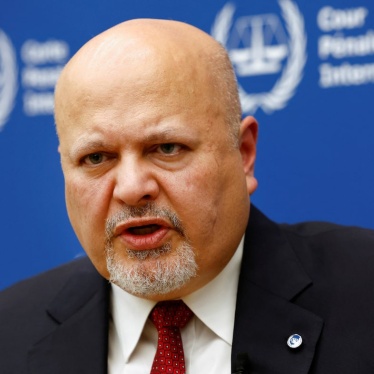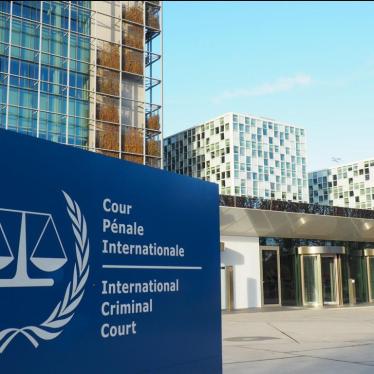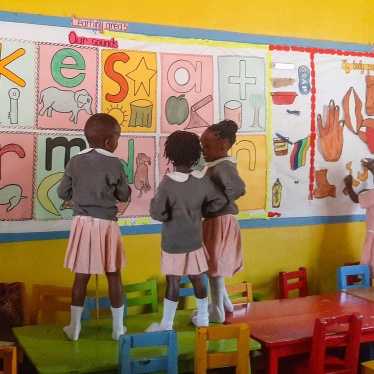(New York) - The International Criminal Court (ICC) announced today that it has issued its first arrest warrant in its investigation in the Democratic Republic of Congo (DRC), and that the suspect is in custody en route to The Hague. The news is a welcome first step toward ending impunity in Congo, but more is needed.
Almost two years after the ICC prosecutor announced the opening of the investigation, the court last month issued a sealed arrest warrant against Thomas Lubanga, leader of the Union of Congolese Patriots (UPC), an armed group responsible for war crimes and crimes against humanity in the Ituri region of north-eastern Democratic Republic of Congo. The warrant, unsealed today, charges Lubanga with the conscription and recruitment of child soldiers who were used to participate actively in the conflict.
"Thomas Lubanga's arrest offers victims of the horrific crimes in Ituri some hope of seeing justice done at last," said Richard Dicker, director of the International Justice Program at Human Rights Watch. "Congolese civilians have already endured far too much terrible suffering. It is long past time to end the culture of impunity, and the ICC has taken its first step towards that goal."
Ituri is one of the areas worst hit by Congo's devastating war, which is still underway. A local conflict between Hema and Lendu ethnic groups that began in 1999 was exacerbated by Ugandan military forces and aggravated by a broader international armed conflict in the DRC. As the conflict spiraled and armed groups multiplied, more than 60,000 civilians were slaughtered in Ituri, according to the United Nations. In addition to abuses committed by the UPC, serious human rights violations were committed by other groups, including the Nationalist and Integrationist Front (FNI), a Lendu militia led by Floribert Njabu.
"Forcing young children to participate in warfare is a serious crime, but the ICC prosecutor must also press additional charges against militia leaders for massacres, torture and rape," said Dicker. "It is vital that Thomas Lubanga, Floribert Njabu and others who committed crimes in this deadly conflict be held responsible and brought to justice. The ICC must send a strong signal that these crimes will be punished."
The Ituri conflict, as well as others in eastern DRC, highlights the participation of non-Congolese forces. Ituri in particular became a battleground between the governments of Uganda, Rwanda and the DRC. These governments have provided political and military support to Congolese armed groups despite abundant evidence of their widespread violations of international humanitarian law. The ICC prosecutor, Luis Moreno Ocampo, has repeatedly stated that he will bring to justice those who bear the greatest responsibility for serious crimes.
"Chief Prosecutor Ocampo should also investigate those who armed and supported militia groups operating in Ituri, including key players in power in Kinshasa, Kampala and Kigali," said Dicker. "The crimes committed in Ituri are part of a broader conflict in the Great Lakes region, and the court should finally pierce the veil of impunity that stretches beyond Congo's borders."
In April 2004, the transitional Congolese government referred crimes committed in the country to the ICC. On June 23, 2004, the prosecutor announced the beginning of the court's investigation in the DRC.
The International Criminal Court, based in The Hague, has broad international support. Currently, 100 countries have ratified the Rome Statute establishing the court, and nearly 140 have signed the Rome treaty. In 2003, states elected the court's first 18 judges and its prosecutor. On October 14, 2005, the court unsealed its first arrest warrants, for Joseph Kony, Vincent Otti and three other officers of the Lord's Resistance Army (LRA) in Uganda. To date they have not been apprehended.
Because the ICC will only prosecute those bearing the greatest responsibility for war crimes, crimes against humanity, and genocide committed after July 2002, it will likely prosecute only a few high-ranking perpetrators. Human Rights Watch called on the authorities in the DRC to conduct meaningful national prosecutions to supplement the ICC's investigation, and urged the international community to support Kinshasa in these efforts.
Background
Over the past five years, Human Rights Watch has gathered hundreds of testimonies documenting widespread human rights abuses by Lubanga and others in Ituri. Survivors told Human Rights Watch how the UPC, a predominately Hema militia group, carried out ethnic massacres, murder, torture, rape and mutilation, as well as the recruitment of child soldiers.
UPC combatants under the leadership of Lubanga slaughtered at least 800 civilians on the basis of their ethnicity in the gold mining region of Mongbwalu between November 2002 and June 2003. In another incident in August 2002, the UPC conducted a "man hunt" for persons of Lendu ethnicity and other political opponents, detaining them in two notorious prison areas where scores were tortured and summarily executed.
In March 2003, the FNI, a militia opposed to the UPC, attacked the town of Kilo in Ituri and killed at least 100 civilians, mostly women and children, whom they accused of helping the Hema. In another incident, FNI combatants tortured, raped and killed Hema women after accusing dozens of spying for their enemies. As one woman told a Human Rights Watch researcher, "They captured the [Hema] women from the surrounding countryside... put them in a house, tied their hands, closed the door and burned them."
As a result of such attacks by the FNI, the UPC and other armed groups, hundreds of thousands of civilians fled their homes into the forest to escape their attackers. Many of them did not survive. One survivor described Ituri as being "covered in blood."
Lubanga, Njabu and others were arrested by Congolese authorities after the killing of nine U.N. peacekeepers in the Ituri region in February 2005. They were charged with genocide, war crimes, and crimes against humanity but have not been brought to trial. Congolese authorities state they have been waiting for the ICC to complete its investigations before taking further action.
DR Congo: ICC Arrest First Step to Justice
Prosecutor Says First Accused Sent to Hague
Your tax deductible gift can help stop human rights violations and save lives around the world.
Region / Country
Most Viewed
-
August 3, 2002
U.S.: 'Hague Invasion Act' Becomes Law
-
November 20, 2024
Syria Violating World Court Order

-
November 21, 2024
Palestine: ICC Warrants Revive Hope for Long-Delayed Justice

-
December 14, 2020
US Sanctions on the International Criminal Court

-
August 29, 2024
South Korea’s Digital Sex Crime Deepfake Crisis


